BY LINCOLN ANDERSON | A jumbo-size sign next to the entrance of Lenox Health Greenwich Village proudly proclaims, “Heroes Work Here.”
The staff at L.H.G.V. have more than lived up to those inspiring words during the deadly coronavirus pandemic.
During the height of the surge last year, part of the Village facility served as a COVID unit. The refrigerated “morgue” trailer on W. 12th St. outside the building was used.
Yet, even healthcare heroes need someplace to unwind and recharge, and never has that been more true than during this grim global health crisis.
In response, under the direction of its executive director, Alex Hellinger, the facility, at Seventh Ave. and 12th St., has created a special tranquility room that its staff can use to center themselves and de-stress.
“People were working 12-hour shifts and wearing all this PPE where it’s hard to breathe,” Hellinger said in a recent interview. “They really needed a place to go. We have lounges. But sometimes people need a place to reflect and relax — no cell phone, no food, no TV.”
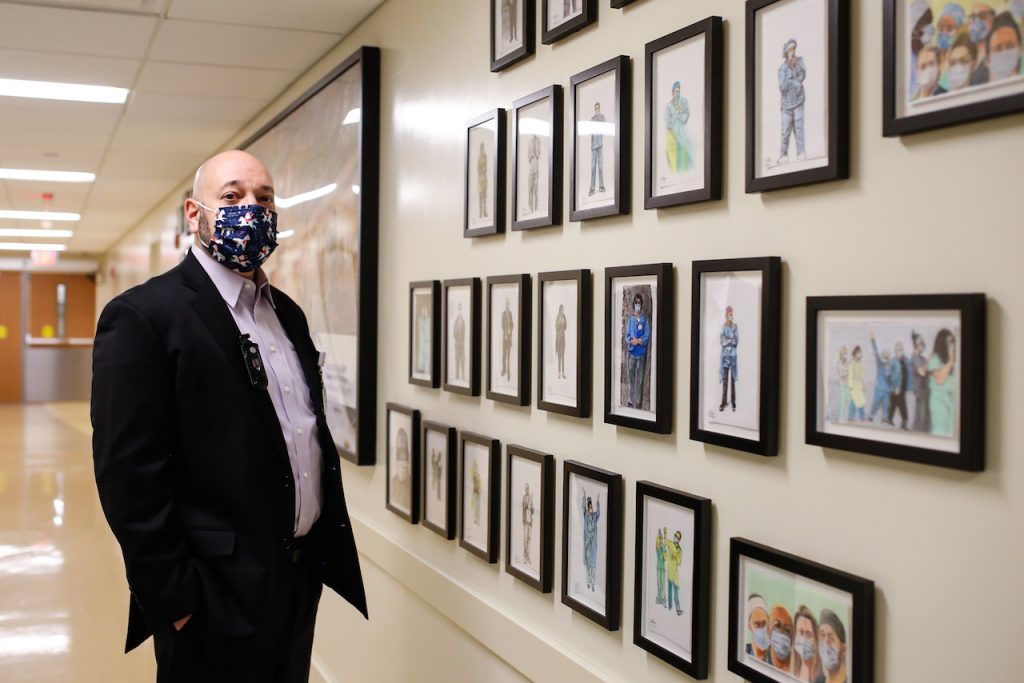
Helping to create a special setting, on the wall right outside the tranquility room are a series of framed drawings of L.H.G.V. nurses and staff that Natan Bibliowicz, a local neighbor, made depicting the “nightly clap” during the lockdown.
Also on that same wall is a large poster showing essential workers battling a giant virus. This is a copy of a Northwell poster that hung over the Queens entrance of the Queens Midtown Tunnel that Hellinger would see every day on his drive into work.
“We had it reproduced,” he said. “Everyone in the facility signed it.”
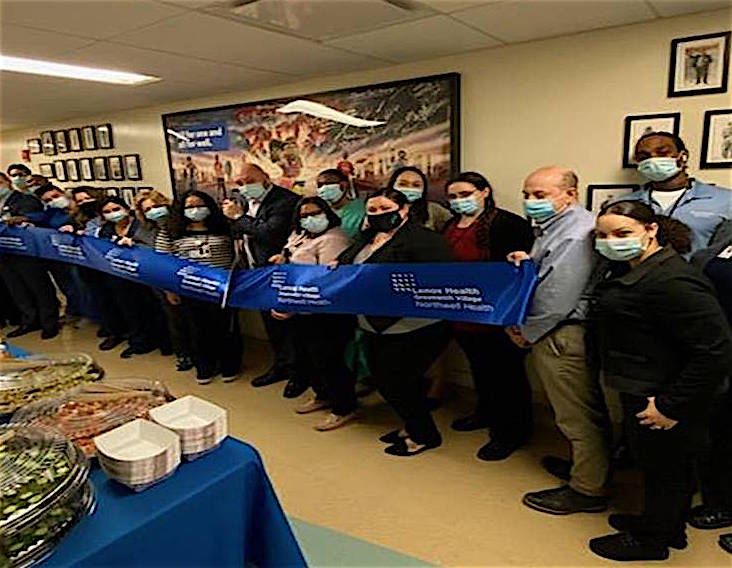
Normally, L.H.G.V. does not serve as an inpatient facility. In the wake of the closure of St. Vincent’s Hospital, it opened six and a half years ago as a stand-alone emergency department and comprehensive care center. Patients coming in who need higher-level care are transported by ambulance to area hospitals.
But COVID changed everything. To help ease the burden on its parent Northwell Health’s hospital system during the surge, the Village facility’s ambulatory surgery unit was converted into a 31-bed COVID unit.
Most of the coronavirus patients at L.H.G.V. were older and awaiting placement back into nursing homes or other facilities. Many were so-called end-of-life patients with DNR and DNI orders (“do not resuscitate” and “do not intubate”).
“There was a fair amount of passing here at the height of it,” Hellinger said. He declined to share the number of deaths, though noted that the majority of the COVID patients there did survive.
The COVID unit has since been converted back to an ambulatory surgery center.
In addition to confronting the virus on a daily basis at work, some staff members simultaneously had loved ones being treated in other hospitals who they could not visit, some of whom did not survive.
“The challenges that we face,” Hellinger said, “employees have had to deal with deaths [from COVID] in their own families, yet they were still coming to work every day to take care of patients. We held a vigil on the roof and people came with pictures of their loved ones who had succumbed to this virus. We wanted to do something for the incredible staff here.”
That something was the tranquility room, which opened with a ribbon-cutting in November. Crystal Loydgren, the senior manager for operations at L.H.G.V., played a key role in both pulling together the funding for the space and designing it.
The space was created by using half of a 300-square-foot conference room. Scenic dividers showing a forest with a small stream separate the tranquility room from the rest of the space.
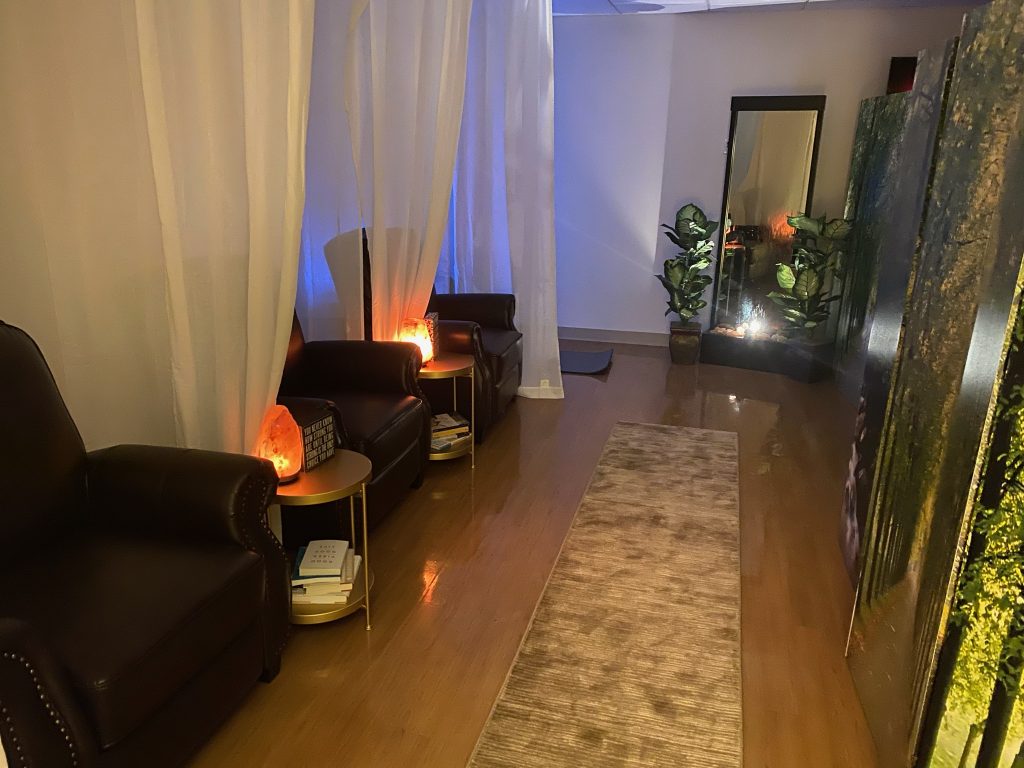
Inside the room there are three leather recliners separated by curtains. At one end of the space is a smaller area for yoga. There is a sound machine to drown out hallway noise and Himalayan salt lamps to relieve stress. Within easy reach on small side tables are books containing affirmations and positive thoughts, some of them donated by staffers. There is an essential-oils diffuser; the room’s users can pick from five scents. Acupressure mats and pads are available for aching feet and necks; due to COVID, the pads are slipped into fresh pillowcases for safety.
“It’s supposed to be where people can just disconnect. Serene,” Loydgren explained.
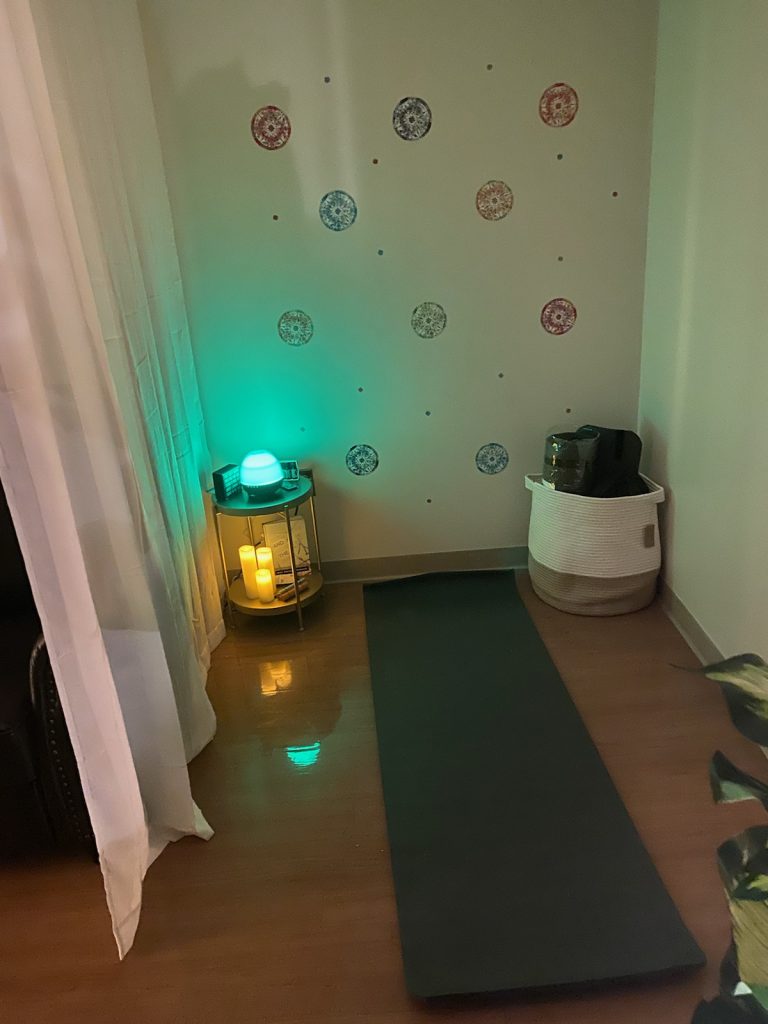
Hanging on the wall outside of the restful room, Bibliowicz’s drawings are a source of pride for the staff. He attended the regular weeknight claps for much of March to June, when neighbors and local firefighters would gather to salute the workers at L.H.G.V.
Bibliowicz, a retired architect who loves to bake, lives a half block away. Initially, he would bring the staff cakes and loaves of sourdough bread he had made. Then, inspired to use his dormant drawing skills, he started snapping photos of the nurses and workers to create portraits from them. He drew in a small 5-inch-by-8-inch notebook with markers and pastels, posting the finished pieces on his Instagram page.
View this post on Instagram
Bibliowicz was very affected by a heartbreaking scene one night at one of the salutes.
“One nurse, when they came outside — it’s tough,” he said, getting emotional at the memory. “She broke down, and the nurses around her were hugging her. I did a portrait of her in pastels and I gave it to her.”
View this post on Instagram
The woman’s brother died from COVID.
“One day at the salute, she came out, and she had made two masks and she gave them to my wife and me,” he said. “And I’ve worn it ever since. The most comfortable mask that I’ve ever had.”
Bibliowicz said his drawings on Instagram became a sensation with L.H.G.V. staffers.
“They got so excited over them,” he said.
Hellinger offered to buy the original artwork.
“I said, ‘You need to buy the drawings? I’m going to give them to you,'” the artist recalled.
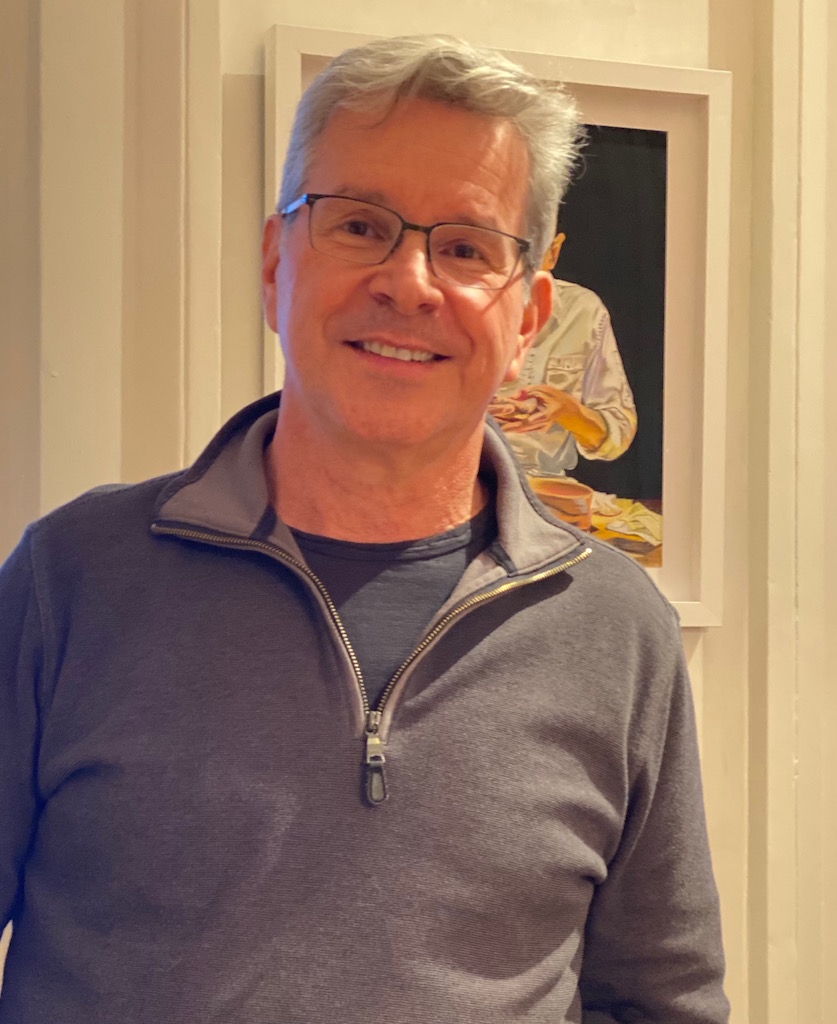
In addition to the tranquility room, L.H.G.V. has also recently prepared another new space. But this one is far larger, at 5,000 square feet. It’s a vaccination center for giving COVID jabs.
It’s located on the fifth floor, at the top of the ship-inspired building, which was originally designed as the home for the National Maritime Union.
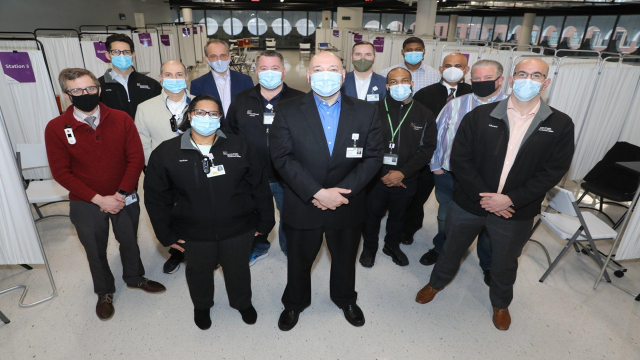
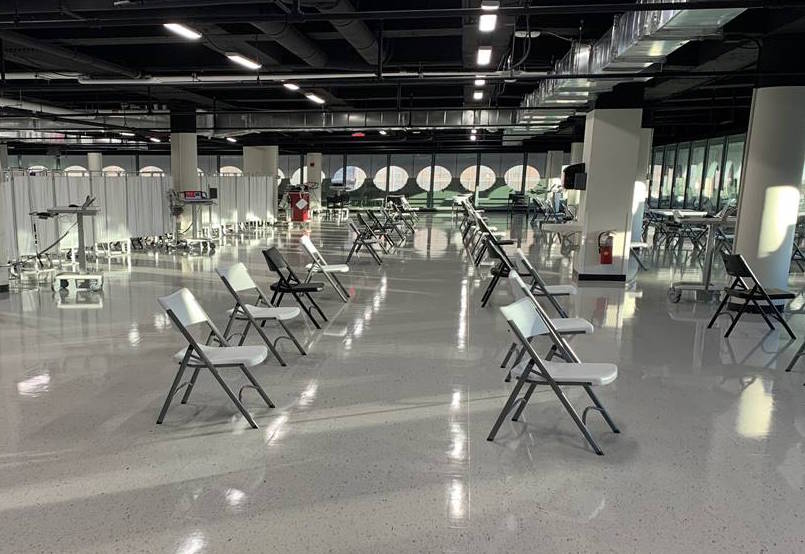
The entire L.H.G.V. staff has been vaccinated, and the facility is now ready to spring into action and start jabbing the public at large. However, the coveted substance is required first.
“We are waiting on the vaccine,” Hellinger said. “Everybody’s trying to get as much vaccine as they can. We are hopeful to get ours shipped soon.”
As for what the operation would be like once it’s up and running, he said, “You really want to vaccinate at least 1,000 people per day.”
Vaccinations at L.H.G.V. would be appointment based and, per current New York State protocol, anyone 65 and over would be eligible.
Meanwhile, as of two weeks ago, the center had performed about 14,000 COVID tests.
L.H.G.V. is also providing monoclonal antibody treatments, which are used when COVID is caught in the early stages and is mild to moderate; people receive an infusion and are then released.
With the darkest days of the pandemic behind us and the vaccine arrived, optimism has returned.
“The virus is still here,” Hellinger said. “There was a bit of a second surge. But the vaccine is a light at the end of the tunnel and it’s giving people a lot of hope.
“We have been in this fight since the beginning to help the community in any way that we can.”

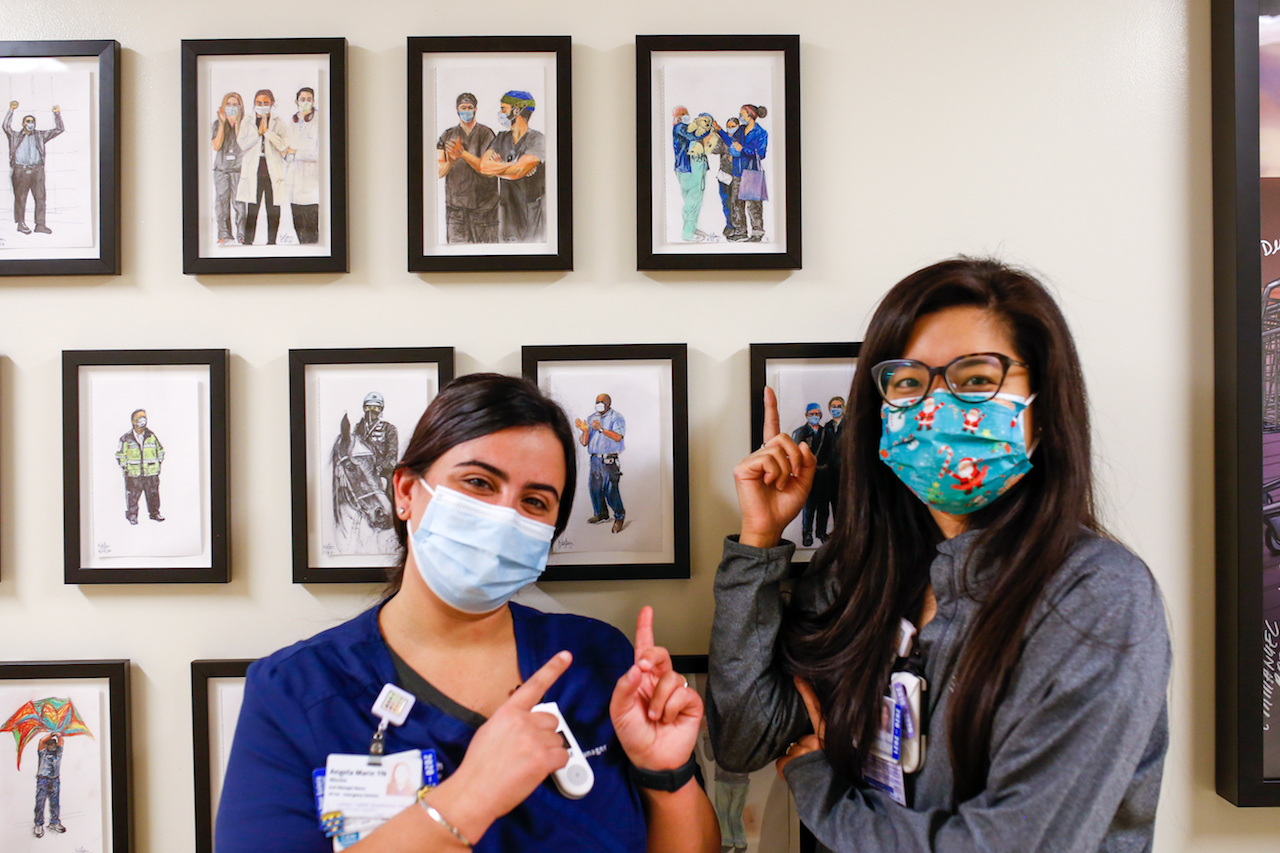
Excellent piece. These health care workers are what is shining through the cloud in the aftermath of Trump.
Sometimes a confluence of horrible things gives birth to a miraculous will to overcome them. Helen Keller turned her life around and inspired the world. In the case of L.H.G.V., a small but powerful ship’s shanty has been transformed into a beacon of hope. Healthcare hearts and minds, the arts and a very soon-to-be Covid vaccination center will help eradicate its scourge. Kudos to Natan and Alex — and to Lincoln — who penned a touchingly photographed piece that sent chills up my spine. Today, I once again felt the warmth of The Village Sun.